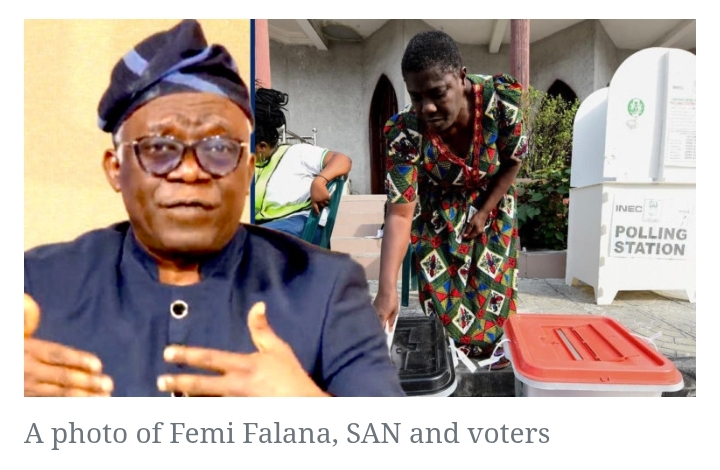Tuesday May 20, 2025 |
Human rights lawyer and Senior Advocate of Nigeria, Femi Falana, has strongly opposed the proposed bill to make voting compulsory in Nigeria, declaring it “unconstitutional” and “impractical” under the current legal framework.
The bill, co-sponsored by the Speaker of the House of Representatives, Tajudeen Abbas, and Labour Party lawmaker Daniel Asama Ago, seeks to amend the Electoral Act to make voting mandatory for all Nigerians of voting age in national and state elections. It proposes a six-month jail term or a fine of ₦100,000 for eligible citizens who fail to vote.
During the plenary on Thursday, Ago, who represents Bassa/Jos North, argued that the bill aims to curb voter apathy and reduce vote-buying. Deputy Speaker Benjamin Kalu supported the bill, citing Australia as a model where compulsory voting has reportedly enhanced civic responsibility.
However, Falana, in a statement issued on Monday, May 19, titled ‘Compulsory Voting is Not Enough’, faulted the legislative move on constitutional grounds.
He said the bill is inconsistent with several provisions of the 1999 Constitution, which guarantee citizens’ rights to privacy, freedom of thought, and freedom of conscience.
“The Speaker of the House of Representatives probably wants Nigeria to join Egypt—the only African country out of 23 globally with provisions for compulsory voting.
“The said constitutional provisions protect the fundamental rights of the Nigerian people to privacy, freedom of thought and conscience, as well as the freedom to register and vote in national and state elections conducted in Nigeria.
“However, it is doubtful whether the Speaker and his colleagues have paid sufficient attention to the relevant provisions of the Constitution. Otherwise, they would have realised that the compulsory voting is constitutionally invalid in every material particular on the ground that it is inconsistent with Sections 37, 38, 77(2), 135(5) and 178(5) of the Constitution,” he stated.
He argued that the legal foundation for mandatory voting is shaky since Chapter II of the constitution outlines the Fundamental Objectives and Directive Principles of State Policy, which remain non-justiciable.
“Compulsory voting cannot be legalised in vacuo. Apart from the possibility that it may be declared illegal under the current political dispensation, it is practically impossible to prosecute millions of Nigerians who may decide to boycott national and local elections that have been reduced to the periodic renewal of misgovernance, corruption, and abuse of power by pampered members of the political class,” Falana warned.
Related posts
Categories
- Advertisements (1)
- Agriculture (45)
- Breaking News (26)
- Business (598)
- Crime (989)
- Education (319)
- Entertainment (128)
- Features (13)
- For The Records (43)
- Foreign News (1,189)
- Health (219)
- Home News (332)
- Interview (9)
- Judiciary (349)
- Lifestyle (140)
- Local News (111)
- National News (1,448)
- Opinion (26)
- Politics (1,012)
- Religion (157)
- Science and Technology (125)
- Security (680)
- Sports (880)
- States' News (819)
- Transportation (330)
- Uncategorized (10)

